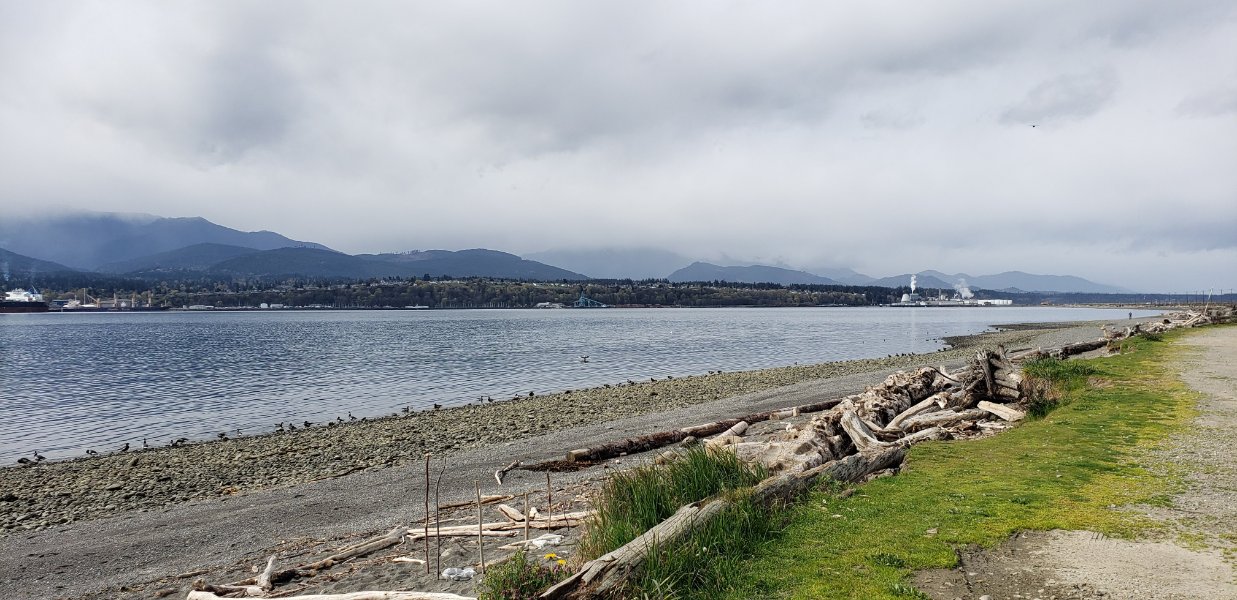
Water laps at the shore of Port Angeles harbor on a cloudy day. Project Macoma will take place through use of a barge and onshore facilities at the Port of Port Angeles log yard.
Carbon pollution is the main driver behind the higher temperatures and severe weather that threatens our environment and economy. Much of the short-term focus of addressing the threat of climate change is on reducing emissions, but new technologies engineered to pull carbon out of the air also promise to be an important part of how we meet the challenge ahead of us.
A pilot project proposed in Port Angeles is designed to test a new approach to removing carbon pollution. “Project Macoma,” as the proposed pilot is named, is an effort by a company called Ebb Carbon to test whether they can use seawater to soak up more carbon dioxide from the air.
Read on to learn more about the project.
What is Project Macoma?
Project Macoma is a first-of-its-kind pilot project that has the potential to remove carbon dioxide (CO2) from marine waters. The project would use new electrochemical technology to speed up how fast the ocean can absorb CO2.
The technology will pull seawater from Port Angeles Harbor and treat it to make the water less acidic, then return the water back into the ocean where it will act like a sponge to soak up C02 from the air.
This two-year project would use a barge and onshore facilities at the Port of Port Angeles log yard.
What is our role in this project?
Our regulatory role is ensuring the project does not impact water quality in the harbor; we are not vetting the potential climate benefits of this project at this time.
Ebb Carbon applied for an individual water quality permit called a National Pollutant Discharge Elimination System (NPDES) so it can safely discharge the less acidic (alkaline) water back into Washington’s marine waters.
We have developed a draft discharge permit for the processed ocean water, and will oversee the company to make sure it complies with the permit rules.
We want to hear from the public
As we work to understand the project’s impact, we are holding a public comment period on the draft water quality permit from July 19-Aug. 18, 2024. The comment link opens online at 12 a.m. July 19 and closes at 5 p.m. Aug. 18. Ecology will review and respond to all comments when we make a final permit decision in the coming months.
This is just one permit the company is applying for; the project needs certain permits from other government agencies to operate.
The permit will be active for four years while the pilot study will run for two years. Ebb Carbon would need to go through Ecology’s permitting process again for any future projects.
How will we know if this project helps fight climate change?
These types of technologies have the potential to help remove carbon dioxide from the atmosphere, but many are so new that we don’t yet know how effective the technology can be. That’s why real world testing like that proposed with Project Macoma is so important: it’s the first project in the country to test this technology in the real environment.
Projects like this give us the chance to gather data, see what works, and better understand the potential benefits and impacts.
October 2024 update
On Oct. 30 2024, Ecology issued the final water quality permit for Project Macoma. The permit covers the two-year pilot project. The final permit incorporates feedback we received during the public comment period, including:
- Lowering the amount of alkaline water they can discharge back into the ocean.
- Establishing stronger monitoring requirements.
After updating the permit and calculations for water quality, we re-ran our modeling and found that potential water quality impacts from Project Macoma’s discharge had decreased from our earlier analysis. The permit reflects this as well. Project Macoma will need to apply for a new water quality permit if they want to discharge beyond the two-year limit of the pilot project.

